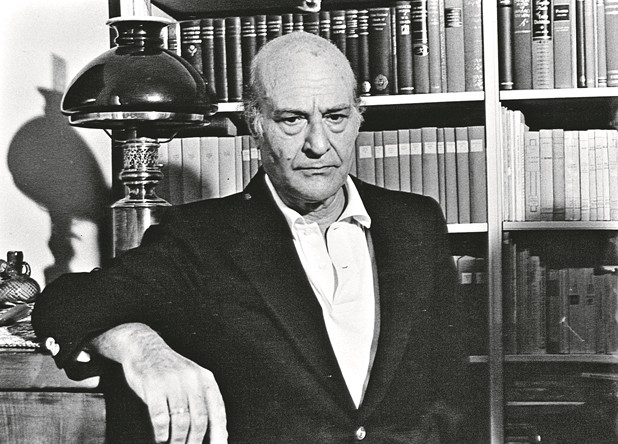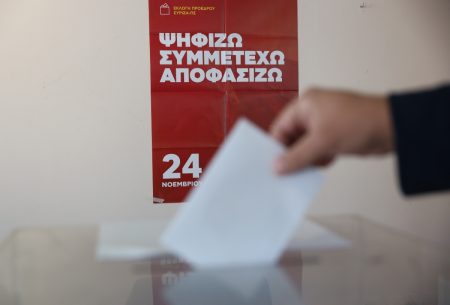Odysseus Elytis was one of the most important Greeks. He was awarded the Nobel Prize in Literature in 1979. He was one of the select members of the so-called “generation of the nineteen thirties” in the field of artistic creation.
Odysseas Alepoudelis, as his real name was, was born on November 2, 1911 in Heraklion, Crete. He was the youngest of the six children of businessman Panagiotis Alepoudelis and his wife Maria Vrana, also from Lesvos. His father settled in Heraklion in 1895, where he founded a soap and kernel factory, and two years later he married his mother.
During the First World War in 1914, Panagiotis Alepoudelis moved his business to Athens and settled with his family at 98a Solonos Street. At the age of six, Odysseus enrolled in the private Lyceum of Makri, which was then located on Ippokratous Street. In 1918, his older sister Myrsini died at the age of just 20. In 1923, one year after the Asia Minor Catastrophe, the Alepoudelis family travelled abroad, to Italy, Switzerland, Germany, Yugoslavia. In 1924, in Lausanne, he met Eleftherios Venizelos, who was the political idol of his family.

In the autumn of 1924 he transferred to the 3rd High School for Boys in Athens. The next year his father died.
During his student years he collaborated with the magazine Diaplasis ton Paidon, he read Greek and French literature and in 1927 he came in contact with Cavafy’s poetry. In 1928 he graduated from high school and came to know the poetry of Kostas Karyotakis. All these years Odysseus visited almost every summer one of the Aegean islands, a fact that will affect the lyrical background of his poetry.
In 1929 he discovered surrealism and read Lorca and Eliard. He wrote his first poems and sent them to magazines under a pseudonym. In 1930 he enrolled in the Law School of the University of Athens and his family moved to 146 Moschonision Street, in America Square. In 1933 he became a member of the Ideocratic Philosophical Group of the University and participated in events and discussions with Ioannis Sykoutris, Ioannis Theodorakopoulos, Panagiotis Kanellopoulos and Konstantinos Tsatsos.
In 1935 he will meet the poet and psychoanalyst Andreas Empirikos and the folk painter Theofilos. At the same time, his friend and colleague George Sarantaris brought him in contact with the literary company, published by the pioneering magazine Nea Grammata. It consisted, among others, of George Seferis, George Theotokas, George Katsimbalis and Andreas Karantonis. His first essay poem entitled Tou Agaiou, under his signature, Elytis was published in Nea Grammata.
In 1936 he met the poet Nikos Gatsos with whom he would be connected by a long and close friendship. Their company includes the painters Nikos Chatzikyriakos-Gikas and Giannis Moralis, as well as the poet Nikos Karydis, creator of the Ikaros publishing house, who will publish most of Elytis’ books. At the same time he will stop his studies in Law and will enlist in the Hellenic Army. He was dismissed as a reserve officer in 1938.
In December 1939, in World War II, he published in 300 copies his first collection of poems entitled Orientations. In 1940 Samuel Beau-Bovi translated the first poems of Elytis into French.
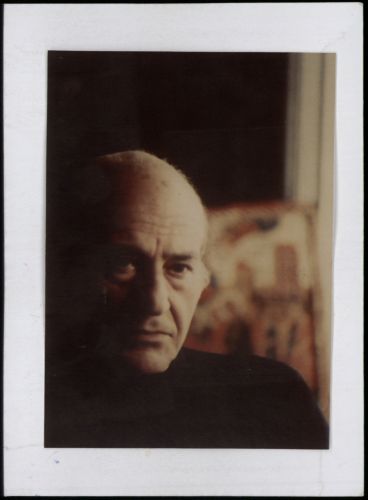
With the outbreak of the Greek-Italian war, he was recruited as a lieutenant and in the winter of ’40, he found himself in the front line of fire. In December 1940 he was advanced with his company inside the Albanian territory. At the beginning of 1941 he contracted typhoid and was transported, at death’s door, to the hospital of Ioannina. He managed to escape the danger and was transported to Athens. His long recovery coincided with the German invasion of Greece and the Occupation.
In 1943 he published his second poetry collection “The Sovereign Sun” together with the “Variations on a ray”, an allegorical resistance during the Occupation, camouflaged in a surrealist form, such as Amorgos of Gatsos and Bolivar of Eggonopoulos, which were published in the same year.
In 1945 he collaborated with the surrealist magazine Tetradio. He publishes translations of Lorca’s poems and one of his own works, the “An Heroic And Funeral Chant For The Lieutenant Lost In Albania”. In the same year, at the suggestion of George Seferis, he was appointed program director of the National Radio Foundation (EIR), a position from which he resigned after a while. During this period he engaged in painting, which was an old occupation of his, complementary to his poetry.
In 1948, during the Civil War, he left for Switzerland and from there to Paris, where he settled. There he became acquainted with the avant-garde of the French intelligentsia (Breton, Eliard, Jara, Camus) and came in contact with visual artists such as Picasso, Matisse, Chagall and Giacometti. In 1950 he visited Spain and at the end of the same year he settled in London, where he collaborated with the BBC.
In 1952 he returned to Greece and the following year returned to the EIR as program director, a position he would hold for only one year. In 1959 Axion Esti was released, a leading moment in Greek literature. This work of Elytis will be widely recognized and will become “the property of the people”, when it will be set to music by Mikis Theodorakis in 1964.
In 1967, the coup of April 21 found him translating excerpts from Sappho, at his new residence at 23 Skoufa Street. After the fall of the dictatorship, he was appointed chairman of the Board of Directors of E.I.R.T. and a member for the second time of the Board of Directors of the National Theater (1974 – 1977). Despite the proposal of New Democracy to include him in the ballot of the deputies of the State, Elytis refuses, remaining faithful to his principle not to be actively involved in political practice. In 1977 he also refused to be named an Academician.
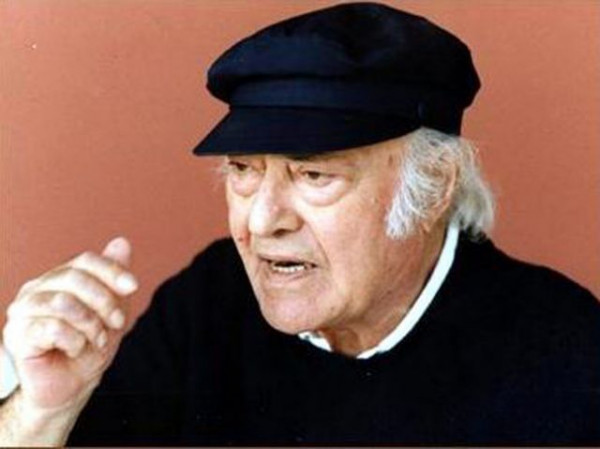
On October 18, 1979, the Swedish Academy announced that he would be awarded the Nobel Prize in Literature “for his poetry, which, based on the Greek tradition, describes with aesthetic power and high intellectual discretion, the struggle of modern man for freedom and creation.” . The announcement of the Swedish Academy points out that Axion Esti is one of the masterpieces of 20th century poetry. Elytis attended the traditional award ceremony on December 10, 1979 in Stockholm, receiving the award from King Carl Gustav of Sweden.
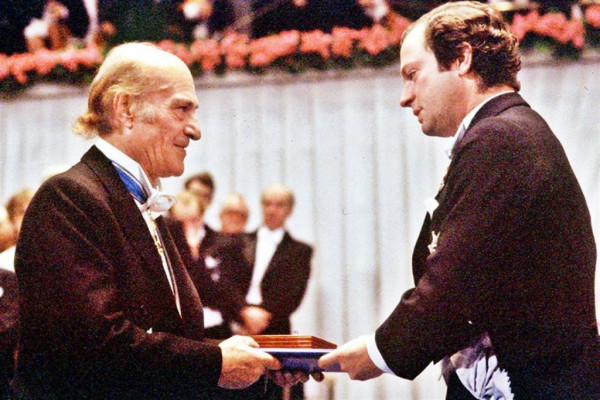
In the following years, Elytis dealt with important publications of his works in poetry, essay and translation. The distinctions and awards for his work, inside and outside Greece, will continue. Odysseas Alepoudelis will die on March 18, 1996, at the age of 85.
